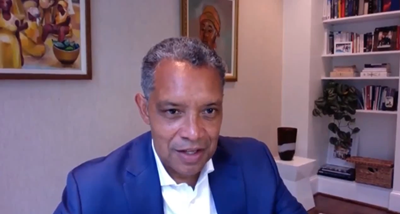CLE Institute Explores Practice Considerations Surrounding Seniors
September 14, 2020
On September 10, more than 100 attorneys participated in the D.C. Bar’s virtual CLE Institute on Aging and the Law, a daylong event that offered an in-depth look at the legal issues affecting elderly clients, wards, and others working with the aging community.
The morning plenary session focused on the aging legal profession and the medical, neurological, physical, emotional, and organizational implications of this demographic trend. Neuropsychologist Dr. Jonathan DeRight discussed the balancing act between avoiding the stereotyping of aging attorneys and guarding against the risk of dementia, memory loss, and other health issues that could potentially impact an individual’s ability to practice law.
Identifying impairment in attorneys can be difficult, DeRight said, because they are better able to adapt to their changing health condition. He then presented changes that normally occur during the aging process — lapses in short-term memory or difficulty concentrating, for example — contrasted against changes that may be an indication of dementia or another mental condition such as frequent difficulty recalling words or communicating.
A plenary session during the virtual CLE Institute featured (from top) Linda M. Jackson of Arent Fox LLP, Thomas E. Gilbertsen of Gilbertsen Law Office, and Dr. Jonathan DeRight.
Linda Jackson of Arent Fox LLP explored the intersection between legal employers’ responsibility to monitor attorneys’ ability to practice and laws prohibiting discrimination or harassment of employees based on age or disability. Jackson examined the Age Discrimination in Employment Act (ADEA) and the Americans With Disabilities Act (ADA) as they relate to an aging workforce, as well as caselaw relevant to the question of whether law partners are considered “employees” covered by the ADA.
Aisha Cassis, who serves on the District of Columbia Court of Appeals Board on Professional Responsibility, discussed attorney ethics requirements, offering examples of situations in which aging attorneys fell afoul of the disciplinary rules. The rules, Cassis said, apply to all attorneys equally. Having been formulated to establish appropriate standards of ethical practice, the Rules of Professional Conduct require that attorneys withdraw from representation if unable to represent a client due to incapacity or disability. In some cases, the rules require lawyers to report colleagues who are incapacitated, and as a result, are no longer practicing consistent with the Rules of Professional Conduct.
Best Practices During the Pandemic
Two of this year’s CLE Institute sessions addressed the impact of the COVID-19 crisis on the elderly, specifically with estate planning and housing. Kerri Castellini of Price Benowitz LLP discussed estate planning considerations, debunking common myths and providing COVID-specific practice pointers. Castellini covered tax implications, various forms of trust and transfer, and related topics. Special attention was given to the impact of the COVID crisis on medical power of attorney and other common estate planning instruments.
An afternoon breakout session focused on adjusting one’s legal practice and representation of elderly clients under the limitations of the pandemic. Jilma Lasso, an attorney with Lasso & Lasso, P.C., discussed concerns relating to the electronic execution of wills and online notarization of legal documents, covering the District’s temporary authorization of remote notarization and the procedures necessary to legally execute documents under this regulation. Attorney Robin Fradkin gave valuable advice about how to meet with elderly clients effectively while maintaining client confidentiality when using technology.
The session also touched on claims to stimulus checks and the changing guidelines regarding transfers from hospitals to nursing homes during the pandemic. Neha Patel of the D.C. Department on Disability Services called attention to resources available to address COVID-related issues confronting the elderly, as well as considerations for fiduciaries regarding their options in dealing with the elderly and others.
Along with the practical considerations, speakers were consistent in their calls for practitioners, caretakers, and others to act mindfully on behalf of their elderly wards, working to preserve both their health and their independence.
Protecting District Elders

In his keynote address, Attorney General Karl A. Racine said ensuring the protection of the elderly during the COVID-19 crisis has required a redoubling of efforts, applauding those in the legal community who have worked to support the District’s more than 80,000 seniors.
“Many of these residents are fully independent, but we also know that many of our senior population need assistance and rely on help in their day-to-day lives--help from caretakers, family members, or government programs. Some simply can't be their own advocate,” he said.
Concerns about abuse and exploitation of the District’s vulnerable adult population led him to establish the Elder Justice Section in the Attorney General’s Office last year, Racine said, leading to some successful prosecutions and the involvement of the District’s Adult Protective Services. The same collaborative and cooperative spirit would be a critical aspect of his formation of a multiagency, multidisciplinary team intended to address long-term care issues, Racine said.
As the country faces an eviction tsunami, Racine said pro bono legal help is needed now more than ever. "Keeping up with current affairs, keeping up with legal affairs, and accessing legal services is more challenging now during the pandemic for seniors than ever before. This means that we have to redouble our efforts to engage our seniors and to protect them,” Racine said.
D.C. Bar immediate past president Susan Hoffman also called upon Bar members to rise to the challenge of representing the aging population. “I hope that you will consider providing pro bono or low bono representation to an elderly client,” Hoffman said, noting that those with representation are dramatically more likely to succeed in their suit or reach a settlement.





